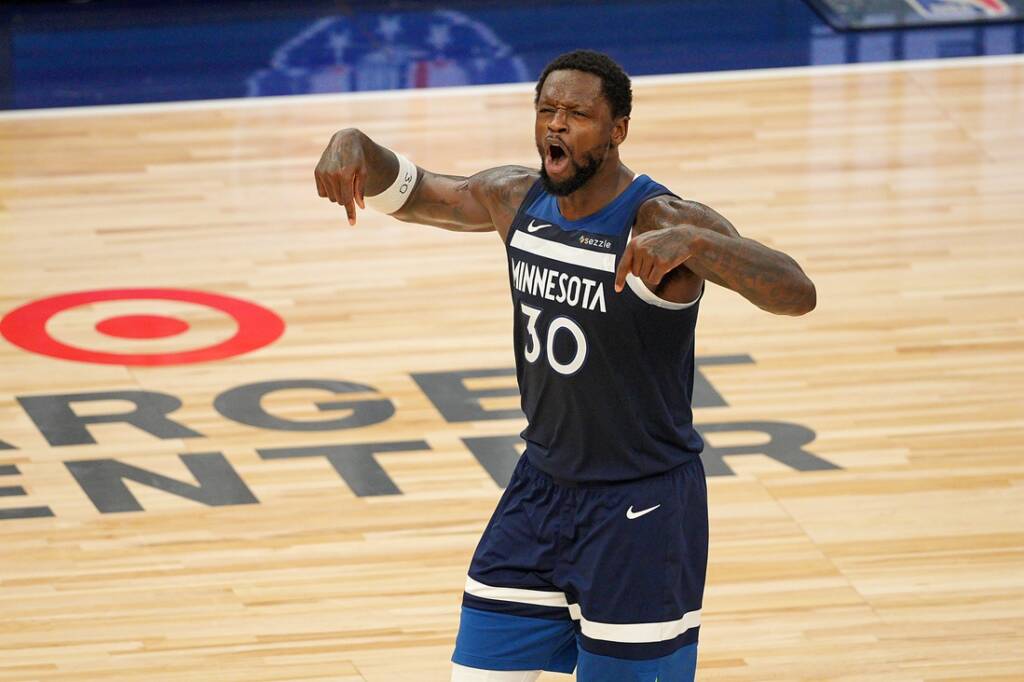Many young players experience reduced usage and become role players early in their careers. Not all first-round picks become stars, something Nickeil Alexander-Walker has become familiar with as he has found his balance within the league. He’s adapted from a promising on-ball offensive-minded guard to the three-and-D off-ball role and has found a home with the Wolves. Still, he had mixed success all season.
Most role players have trouble finding consistency, especially with young players. NAW has stood at that crossroads throughout his 5-year NBA career.
In Alexander-Walker’s Minnesota tenure, his key offensive trait has been his importance to the Timberwolves as a three-point shooting threat. NAW has shown considerable improvements to his shooting numbers in Minnesota compared to his time in Utah and New Orleans. Still, his shooting consistency and versatility varied throughout his successful 2023-24 season.

Alexander-Walker plateaued after an intriguing start to his career with the New Orleans Pelicans. He could not shake his scoring inefficiencies, and they replaced him with CJ McCollum. Attempting to bring more balance to the guard room that had just lost Lonzo Ball to the Bulls. It’s hard to get a good read on his stint with the Utah Jazz because they had been cycling through players since trading Rudy Gobert and Donovan Mitchell. However, NAW’s career shooting statistics improved when Minnesota traded for him, and he established a role.
The Wolves remolded NAW’s offensive role, simplifying the game to increase catch-and-shoot three-point opportunities and making ball-handling duties the secondary option. That change can be an effective way to focus a player’s game, but it can also hinder his overall development.
NAW is a strong but flawed shooter. He’s a stand-still shooter who is significantly less effective as a movement shooter. However, Alexander-Walker is a relocation threat, doing a great job sliding back to the corner off his drives.
Still, the opposing defense’s No. 1 focus with NAW will be to chase him off the three-point line. His counter with his signature “electric slide” side step three has effectively beat this. However, he struggles to find consistency whenever he is within the arc.
Alexander-Walker can fix a lot of this, and some of the issues within his consistency come down to roster construction. The Wolves had effective three-point shooting between Karl-Anthony Towns, Naz Reid, Anthony Edwards, and Mike Conley. Still, much of their bench lineups often relied too heavily on NAW to always be in the same rhythm.
Players who play only 20 minutes a game and who are not world-class shooters will always have droughts in those circumstances. That will only make the half-court offense drag behind in those crucial bench minutes, which often derailed the Wolves.
We saw the effects of those crucial droughts in the playoffs when NAW shot 29.6% over 16 games. It is already difficult enough for shooters and their streakiness within the playoffs because they can become a one-trick pony. In NAW’s situation, it only worsened as the playoffs continued.
Spacing issues only became more prevalent when the Wolves plugged Kyle Anderson into the rotation against the Dallas Mavericks, a series in which NAW shot an abysmal 3 of 16 from three. He was still getting solid looks despite his struggles. However, Alexander-Walker was unable to use his three-point shooting to space the floor, tanking the offense.
Alexander-Walker’s trends continued into the Olympics. His shooting and offensive output limited his role on Team Canada. Between Canada’s exhibition games and the Olympics, he shot 2 of 14 from three in seven games.
NAW is still a net positive for the Wolves because he provides enough offense alongside his impressive perimeter defense, all while on a 2-year, $9 million contract. His shooting consistency and versatility will continue to prove who he is as a player. Coming into the final season of his contract, the Wolves will have a pressing decision with NAW, and he still has much to prove.
Minnesota’s luxury tax situation and leaguewide changes with the tax aprons may give the Wolves some extra leeway if they want to keep NAW around past this season. The middle-class contract market appears to be vanishing. However, whether the Wolves retain NAW will ultimately come down to his performance this upcoming season. He must continue to prove that he is the shooter to unlock the rest of his game.

